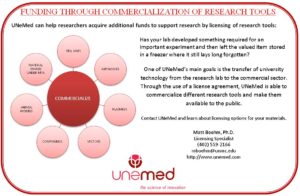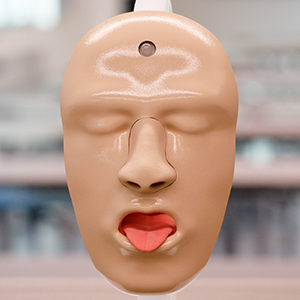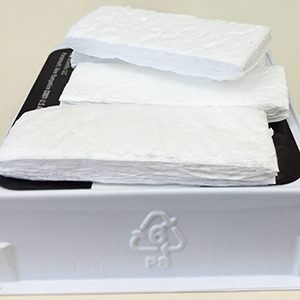by Agnes Lenagh, UNeMed | July 10, 2012
Many of you have probably seen some of our posters asking investigators to submit their research tools to our office, so we can commercialize them. However, you may be asking yourself, “what exactly is a research tool and why would they be valuable?”

Research tools are items that you created in your lab and use to perform day-to-day experiments. Common examples of research tools include antibodies, cell lines, mouse models, small molecules, chemical reagents, growth media, and many other types of materials. These research materials are usually created by a researcher to help complete experiments or research projects so that they can obtain data for publications and grants. Sometimes, however, these research tools can have much broader value and utility.
Many research tools can become integral parts in drug discovery and drug development. Pharmaceutical companies often require research materials, such as cell lines or mouse models, to help in various aspects of drug development. Instead of using their time and money to develop these research tools internally, companies often seek to obtain them from outside sources including universities.
Furthermore, research tools like antibodies and small molecules, assuming they do not have any direct therapeutic applications, are items that can be developed rather quickly into products for the research market. There are numerous companies, many of which you are probably familiar with, that sell antibodies, chemicals, culture media, etc. What may surprise you is that many of these products were originally created in universities like UNMC.
UNeMed uses license agreements to transfer research tools to companies (a licensee) and to restrict or limit what they can do with the research tools. Typically, these licenses can be broken up into two types: a license that allows for the sale of the research tool by the licensee or a license that only allows the licensee to use the research material for internal research projects.
So, what’s in it for you?
When UNeMed licenses a research tool we generally seek upfront license fees and royalties, assuming the research material is going to be sold by the licensee. Money that is generated through the license agreement is then shared with the researcher and can help fund additional work in their laboratory.
So, who knows? Maybe you have a key research material sitting in your freezer and it could be a valuable tool for drug discovery or could be the next big seller in the research tools market.
If you have any questions about research tools or think you have a research tool that may have potential value outside of your laboratory, please contact Matt Boehm and he would be happy to discuss the possibility of commercializing your research material.
Next week we will be discussing Material Transfer Agreements and how these can be used to share research tools while protecting their intellectual property.











